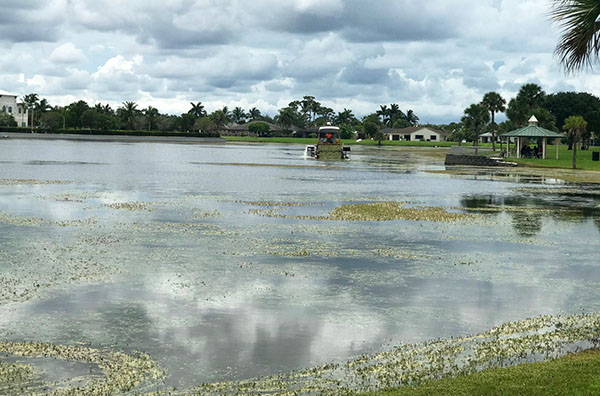
The Royal Palm Beach Village Council voted unanimously Thursday, March 21 to award a contract to Texas Aquatic Harvesting to remove floating vegetative debris as needed during the upcoming rainy season.
The village boasts almost 20 miles of scenic canoe trails, lakes and recreational waterways. The waters are clear and inviting this time of year, but village officials are already gearing up for their annual war on floating weeds and debris, fought every summer on a battlefield consisting of the village’s 750 acres of waterways.
Many residents cherish everyday views of bass jumping, ospreys diving, wading birds hunting and mother ducks swimming with ducklings in tow, but vegetation threatens these idyllic vistas.
Each summer, environmental conditions can cause local populations of floating plants to explosively bloom so enthusiastically that entire lake surfaces can become hidden from view under all the floating plants.
It’s an annual battle. Temperatures get warmer, the rainy season washes fertilizers from lawns into waterways and floating plants bloom so prolifically that beautiful reflective waterways are turned almost overnight into marshes of thick floating weeds.
The village chose to “piggyback” on a contract that Texas Aquatic Harvesting already negotiated with the South Florida Water Management District. The contract calls for an initial one-year term, followed by two options of one year each. Since the contract is “piggybacked,” the village can only request an annual extension if the SFWMD does.
Public Works Director Paul Webster briefed the council on the item that was pulled from the consent agenda for a full discussion.
“For failure to remove floating vegetation properly, we dismissed our former contractor for poor performance,” Webster explained. “This vendor is contractually required to respond to village needs within 72 hours of a request.”
Summer floating weed blooms can become so thick that fishing and boating can become problematic, and the aesthetic pleasures of village waterways are debased by acres of rotting vegetation. That’s also when scores of residents pick up the phone each May through September to complain to village officials.
“The frustration is understandable. Residents want the canals to be available for their intended uses. Unfortunately, our canals are shallow, well fertilized and continuously flowing,” Village Manager Ray Liggins said. “This means growing aquatic vegetation in the warmer months is accomplished without effort.”
Liggins went on to explain that harvesting has benefits over other ways of controlling the weeds.
“Preventing all growth chemically by spraying would create a septic, rancid environment that would create pollution,” Liggins said. “We feel that the most reasonable approach to maintaining our canals is to control the aquatic growth while maintaining some vegetation to attenuate nutrients and provide a fish habitat, with periodic removal of the heavy growth.”
Village strategy is to remove the thickest of weeds mechanically using harvester boats and then trucking the plant waste away rather than letting it settle and rot on the bottom, creating even more of a problem.
The higher the quantity of nutrients or fertilizers like phosphorous and nitrogen in the water, the faster and more robust the growth of aquatic plants and algae.
Brian Gentry oversees fresh surface water quality for the Palm Beach County Department of Environmental Resources Management.
“We urge village residents and landscapers to exercise care and comply with best management practices in dispensing lawn fertilizers which can runoff into, and pollute, our beautiful surface waters,” he said.
While Royal Palm Beach is not required to test surface waters, neighboring jurisdictions like the Indian Trail Improvement District are required by regulation to monitor water quality. “Lots of the water entering Royal Palm Beach comes south from our 40th Street sampling point, which we test bimonthly,” ITID Engineer Jay Foy said. “We just sent in our February results, which show some of the lowest nutrient levels in a decade, but it is dry season.”
Village officials know this will change come rainy season, and they are prepared. The village spent more than $223,000 on floating vegetation removal last year and expects to spend just under $200,000 this summer.
So, when well-meaning homeowners overfertilize their lawns this spring, as the summer rains inevitably come, the warm water and bright Florida sun create perfect photosynthetic growing conditions for morphing village canals and lakes into floating vegetative debris fields. When residents pick up their phones and call to complain, Liggins and his team will be ready.







